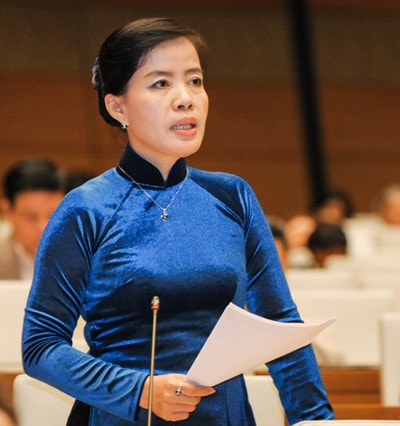'Please give from land, resources to titles'
"The mechanism of asking and giving is a machine that creates negativity, a "healthy" environment for corruption to arise."
Ms. Nguyen Thi Kim Thuy - Standing Member of the National Assembly's Committee on Social Affairs expressed the above opinion when discussing the draft Law on Anti-Corruption (PCTN) at the 3rd plenary session of the Judicial Committee examining the draft law on September 28.
“Please give from land, resources to titles”
Ms. Nguyen Thi Kim Thuy said that the amendment has not met the requirements, especially the current situation of the asking-giving mechanism and cronyism.
“The mechanism of asking and giving is a machine that creates negativity, a “healthy” environment for corruption to arise” – delegate Thuy said and emphasized that if there is less work to “ask” then there will be no reason for bribery or corruption. Because asking is giving and giving is also asking.
 |
| National Assembly Delegate Nguyen Thi Kim Thuy |
According to Ms. Thuy, the percentage from projects, contracts, and credit sources is flowing into the pockets of both the givers and the takers. The problem is what to ask for and what to give? Asking for and giving many things, from budget, credit, land, resources, titles, etc. The two most important things are money and power, and “asking for and giving” related to power is much more diverse and complicated.
For example, access to credit, social services, market access, access to resources including land, the biggest risk is that the criteria to determine who is and who is not allowed access are unclear, leading to negative consequences.
Regarding cronyism, according to the Standing Member of the Committee on Social Affairs, we have long been saying that state-owned enterprises associated with state agencies have a great opportunity to influence the decisions of public agencies, so this association has many potential risks of causing corruption. However, the association of private enterprises with state officials has much greater potential risks.
That attachment is based on familiar relationships, family relationships - cronyism. It is a type of "sponsorship" of family companies, and a means to legitimize stolen assets from the State because with the patronage of officials, the friendly companies can win all the lucrative contracts of the State-owned enterprises.
“It’s like a doctor with a private clinic trying to transfer rich patients from public hospitals to his clinic. Cronyism has distorted market relations and, more seriously, corrupted and transformed the public authority system,” Ms. Nguyen Thi Kim Thuy compared.
Publicity about personnel work must be clearer
Mr. Nguyen Van Kim - Director of the Legal Department, Government Inspectorate said, to avoid duplication with regulations on public content and transparency in specialized laws, the draft focuses on amending and supplementing regulations on public principles, public content, and public forms.
“In particular, clearly define the responsibility for publicity belonging to the head of the agency, organization, unit, the press conference regime, the speaking regime, the right to request information of agencies, organizations, units, individuals and link it with the implementation of accountability of competent agencies, organizations, and individuals when requested,” said Mr. Kim.
Delegate Nguyen Thi Kim Thuy said that, at first reading, it seems that there are many additional solutions such as press conferences, responsibility for transparency of leaders, etc. However, through research and comparison with current laws, the new regulation has not yet overcome the current practical situation.
According to Ms. Thuy, the draft has many unclear points. The public content on the organization of the payroll, personnel work and the implementation of policies for civil servants, public employees and workers must be more specific and detailed, especially recruitment, appointment, rotation and even spending for management staff. Currently, corruption in personnel work and group interests in personnel work are the focus of attention of voters and the whole society.
Ms. Nguyen Thi Kim Thuy gave an example of Article 18 stipulating accountability, but if it is only explained when requested, it is not appropriate. That is, if the requester does not request, he does not have to explain. Therefore, it is necessary to add self-accountability to create high consensus, "to avoid the problem from becoming a big problem".
Considering that the Draft supplements regulations on handling violations in implementing transparency but is very general and not strict enough to handle violators, the female delegate proposed adding specific sanctions corresponding to each violation of transparency.
Regarding the regulation on public disclosure of asset and income declarations, Ms. Nguyen Thi Kim Thuy said that the options are still very formal, because they are only made public in conferences and meetings of agencies, organizations and units, so people do not know, and the mass media do not know.
“Reality shows that we cannot control the income of people in general and of those who must declare their assets in particular. We propose a plan to control the assets of the whole society, including the assets of civil servants, public employees and people with positions and powers” – delegate Nguyen Thi Kim Thuy expressed her opinion./.
According to VOV


